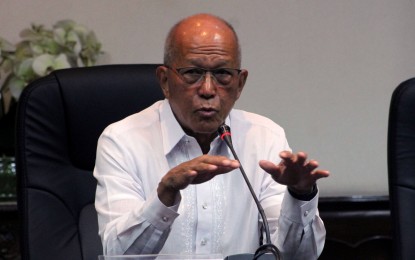
Defense Secretary Delfin Lorenzana. (File photo)
MANILA – Department of National Defense (DND) Secretary Delfin Lorenzana on Wednesday said Republic Act 11479 or the Anti-Terrorism Law should not regulate social media.
"No, the ATL should not regulate social media. It is not part of its mandate and it would violate freedom of speech and discourse," he said in a message to reporters.
Lorenzana's remarks came after Armed Forces of the Philippines (AFP) chief-of-staff Lt. Gen. Gilbert Gapay proposed to include some measures regulating social media in the implementing rules and regulations (IRR) of the law, saying the platform is being used by terrorist groups to radicalize, recruit and plan their attacks.
"I asked Gen. Gapay yesterday (Tuesday) what he meant because I was likewise surprised to hear him say it during our (press conference) after he was installed as CSAFP. He said his explanation was incomplete. According to him, he meant the darknet, that clandestine network that peddles drugs, traffic people, sells guns and explosives, hire assassins and other illegal activities," he added.
Lorenzana, however, said even this side of the internet is difficult to regulate as it operates underground illegally.
Meanwhile, AFP spokesperson, Marine Maj. Gen. Edgard Arevalo said what Gapay meant by "regulating" is looking for the need to explore mechanisms by which would ensure that social media will not be used as a convenient tool to promote terrorism, recruit new members, solicit and generate financial, logistical, and material support from domestic and foreign sources.
"This seeks to prevent and avoid a repetition of the tragic experiences our people have suffered in the past from the hands of terrorists which have resulted to countless and senseless deaths of innocent citizens or their serious physical injuries, the deliberate massive destruction of vital government infrastructures and public properties which translated to billions of pesos of worth of losses of taxpayers' money," he added in a media statement.
Arevalo said the aftermath of the destruction caused by terrorist attacks, which also include private property, often cost millions of pesos and hugely cripple the country's economy and discourages potential foreign investors.
"He (Gapay also) talked about that view on account of the AFP’s own experience in fighting terrorists in Marawi much as that has been the lessons of other countries’ around the world in their own campaigns against terrorism," he added.
Arevalo said if Gapay were to give his inputs to the IRR, the AFP chief is aware that the military is just one among other agencies to be consulted and his view is subject to constitutional limitations, existing laws, and regulations.
"The AFP assures the public that it will not curtail and instead protect the people’s right to free speech, assembly, and redress of grievances as enshrined in the Constitution," he added. (PNA)
